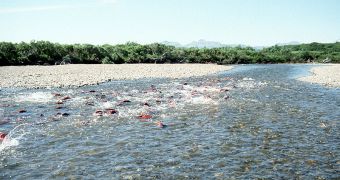University of British Columbia releases a new study that presents global warming as a major threat for the already weak fish population, implying further losses for major fisheries.
Unless authorities implement stricter regulations to overcome the effects of this phenomenon, the economical viability of such operations will be questioned in the near future, according to Science Daily.
The study was supported by National Geographic, the World Bank and U.S. National Oceanic and Atmospheric Administration and the Pew Charitable Trusts and brings into discussion the way in which consequences of the climate change will manipulate the profit margins of companies operating in this field of activity.
It has already been proved that the increased water temperature will make several fish species migrate in search of cooler areas, in deeper water and especially towards the poles.
Such a forecast may come as a blessing for the owners of fisheries located far north, but, overall the profitability of fishing companies will significantly decrease. The ones located in hot regions might be forced to relocate or think about reconverting their entire line of business.
Climate change isn't the only factor threatening the balance of fish population. It goes hand in hand with human activities, such as overfishing and water pollution.
While analyzing the negative effects in order to determine how significant the total losses will be, experts say that, so far, climate change has modified the body dimensions of fish and proves to be a key element in explaining the higher mortality rate.
"Changes in temperature and ocean chemistry directly affect the physiology, growth, reproduction and distribution of these organisms. Fish in warmer waters will probably have a smaller body size, be smaller at first maturity, with higher mortality rates and be caught in different areas. These are important factors when we think of how climate change will impact fisheries,” according to William Cheung, a biologist from the UBC Fisheries Centre.
Scientists say that the marine creatures have to deal with a less friendly habitat, drawn out by increased temperatures and a higher level of acidity. All in all, the best solution would count on governmental support, but experts expect the authorities to face difficulties in diverting funds from one sector to another.
The main challenge would be to preserve and harness abundant fish populations, able to deal with natural and manmade disrupting factors.
Since they are working with forecasts rather than facts, at this point in time, "Governments must be anticipatory, rather than reactive," according to Rashid Sumaila, from the Fisheries Economics Research Unit at UBC and also the leading author of this recent study.
"We all need to think more of the future while we act now," added Sumaila.

 14 DAY TRIAL //
14 DAY TRIAL //